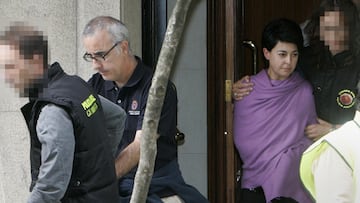‘The Asunta Case’ on Netflix: How long were the prison sentences for Rosario Porto and Alfonso Basterra?
Asunta Basterra’s parents were accused of her murder and sentenced to 18 years in prison. Her mother committed suicide before fulfilling the sentence.

Netflix has released “The Asunta Case”, a series based on real events that narrates the murder of Asunta Basterra, a 12-year-old girl in Santiago de Compostela in Spain. The crime rocked the country in 2013, when her adoptive parents, Rosario Porto and Alfonso Basterra, were accused of the crime and subsequently sentenced to 18 years in prison.
The series, starring Candela Peña and Tristán Ulloa, recreates the events of the case in detail and offers two versions of what could have happened, based on the trial. Behind the show is Bambú Producciones (Bamboo Productions), known for its work on other true crime dramas.
READ ALSO: What The Simpsons would look like in real life, in 1950
‘The Asunta Case’: Chronology of events
Asunta, a girl adopted from China by a couple from Galician high society, was last seen on September 21, 2013. Her parents, a lawyer from France and a journalist, reported her disappearance that night.
They said that they had last seen her a few hours before they made the report, which generated rapid mobilization of the local authorities. A day later, Asunta’s body was found on a forest track near Teo, a few miles from Santiago de Compostela.
An autopsy would later reveal that Asunta had been asphyxiated and had received high doses of the sedative Lorazepam in her system, suggesting that she had been drugged before her death. The evidence pointed to a homicide.
READ ALSO: The best of Netflix’s May new releases
Parents become suspects
As the police investigation progressed, suspicion begin to fall on Asunta’s parents due to discrepancies in their statements. The evidence collected included security camera records, testimonies and evidence that contradicted the initial versions of the events provided by Porto and Basterra.
In the month of October both were arrested and accused of murder. The investigations revealed a pattern of abusive and manipulative behavior towards Asunta, as well as evidence of prior planning of the crime they committed.
Resolution of the case
In June the following year, the judge ended the investigation and began the oral trial, initially scheduled for 2015. However, it was not until October 2015 that the trial began with 34 witnesses and 60 experts.
After a highly publicized trial, the two were found guilty of murder and sentenced to 18 years in prison, each sentence published on October 30, with the entire jury agreeing that Porto and Basterra were guilty of the crime.
Related stories
In May 2016, the verdict was modified, since it was not considered proven that Alfonso accompanied Rosario in the car. November 18 was the last key date in the case, when Porto’s lifeless body was found inside her cell in the Ávila prison, after she committed suicide by hanging.
The Asunta case continues to be the object of study and analysis by criminologists, sociologists and the general public. It sustains interest not only because of its legal and criminal aspects, but also because of what it reveals about family and social dynamics in the context of apparent respectability and success.


Complete your personal details to comment